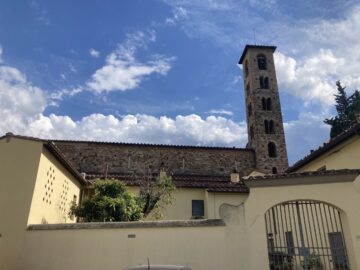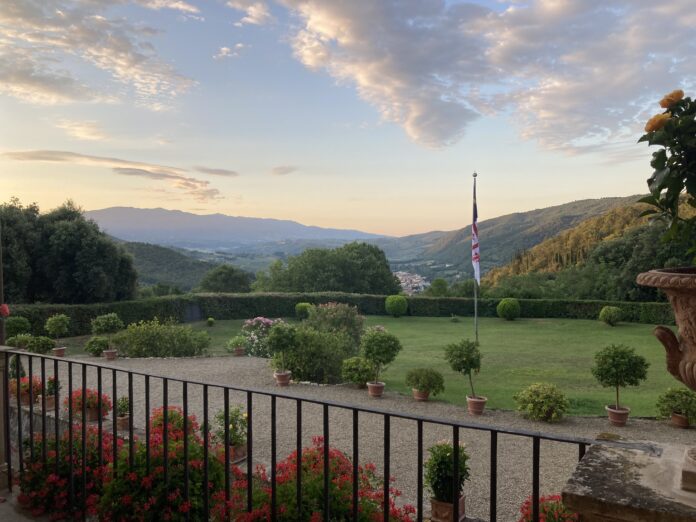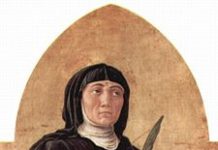I left off these reflections with my arrival in Florence, after the Purgatory – I will not say hell, for it had its end – of the overnight bus ride across the border. I now take them up again as I depart. I do not wonder that the bus drivers – and so many others who have to deal with the myriads of tourists – were in such tempers. There was a family trying to board with multiple sets of luggage, when the rules quite clearly stipulate one, and only one. But what is the driver to do? Tell them to leave their luggage on the side of the road? I wondered if it ever came to that. I was trying to calculate the weight of the bus with all those people and suitcases aboard, but gave up. It was hopeless. Well, almost. For we did get to Florence.
I took the train shuttle downtown from the bus stop outside the city, and a pleasant young couple offered to show me the way to the train station, where I was to catch the 8:25 am into Sieci, a village of 3500 or so souls about 10 miles east of Florence. All the houses there and as far as I could tell in all the surrounding region look much the same, all in a sun-drenched ochre. I hiked down to the village one afternoon, visiting the parish church of Saint Giovanni Baptista, a small brick building, with a lovely campanile.

There is poverty, the apartments old and cramped, what lawns there were, scrabbly. Was this the legacy of the Italian love of socialism?
In the hills just above Sieci is the central house and seminary of the Institute of Christ the King, High Priest. A young seminarian from California picked me up – I was to discover there were a number of Americans amongst their ranks – drove up into the steep, switch-back road to their Institute.
The seminary and house of formation is located in an ancient villa, dating back to the 15th century, and owned or most of those years by the noble Gricigliano family. The grand main house and other subsidiary houses overlook the vast valley below, and there are few words to describe the beauty of the location. As someone said, when God created the world, He took a little more time with Tuscany. The Gricigliano estate comprises acres of land – I know not how many, but was told the property extends all the way down the mountain to the village, a large section which is dedicated to a vineyard and olive trees, cultivated by the Griciglianos for all those years, and now by the seminarians and other workers.
The Institute came into possession of such a place by the vagaries of providence. It seems that by the middle of the 20th century, the direct line of the Gricigliano family had only two spinsters left, apparently with no prospects or desire for marriage. Perhaps their intended husbands had died in the Great War. But they were devout Catholics, and wanted their land to be used by a traditional Order. It was first given to the Benedictines of Fontgaumbault, but they did not attract enough vocations. So the Abbot arranged the villa to be given to a new apostolic endeavour, founded in the propitious year of 1989, the Institute of Christ the King, High Priest, dedicated to the splendour of liturgy in the traditional rite. This was one year after Pope John Paul II promulgated Ecclesia Dei, and helped found the FSSP. Like the FSSP, the Institute of Christ the King is in full union with the Church, now with houses across the world. The place is bursting with virile young men also from across the world, America to Korea, eager to give their lives to God and service in His Church.
I was warmly received, and soon adapted to their precise, one might say ‘aristocratic’ way of life. I would use that term in its original sense – striving for the ‘best’, and for virtue. There is order, in the way they say Mass and the Divine Office, which they pray – well, chant – together, as befits canons. It is good to hear men sing the praises of God. Not operatic nor loud nor self-absorbed. No vibrato or violence to the vocal chords. Simple chant, but with those baritone voices in perfect unison. They practise chant everyday as part of their curriculum, which is solid and orthodox, Thomistic and Patristic. They teach in French, which even the unilingual Americans learn. Near total immersion does that to a young mind.
The seminarians – who go by the title of Abbé – were all filled with exuberance and joy, one of the hallmarks of a true vocation. They work hard, spiritually, academically and physically, and are all the better for it. I did read of some controversy surrounding the Institute – too much discipline, control and so on. They mostly keep silence in the halls, which may be disconcerting at first, but soon provides a peace; they will respond warmly when spoken to; they aren’t permitted cell phones or personal computers, but can call home from central phones and send emails; they promptly obey the various bells summoning them to work and prayer, and to what the superiors ask them to do; the Liturgy is precise and almost regimental, the vestments and chapel ornate. Sure, there are aspects of the life with which this writer might demur, but who am I, and, even so, this is not the time to speak of such. Perhaps later, I may offer some words once my thoughts have settled. The seminarians, at least, seem open to discussion, criticism and to adapting. As the saying goes, ecclesia semper reformanda est – the Church always in need of reform. And that includes all the societies, and we ourselves, within the Church.
It was a good sign that they were willing to do so. They all seemed to be there of their own free will, given ample time to call home, and return for yearly holidays. In many ways, other seminaries could learn from them, for young men – and even those of an older vintage – want a challenge. Enough effete-ism (if that’s not a word, it should be), and whatever it was Pope Francis went on about in that controversial Italian term I won’t repeat here. Esto vir, God exhorts, even commands. We could use a few more good men, and, from what I could tell, Christ the King is providing them.
I will say that the food, like the Frauenthal convent, is just as delicious, but greater in quantity, as befits the recipients. From the vineyards and olive groves, the Institute produces their own grape and olives, and make their own quite fine wine and oil, which goes with every lunch and dinner. What more need be said? My final dinner with them was a joyful occasion – they all were – with the Americans cooking up a cultural feast of smoked burgers and pulled pork.
One of my favorite places to pray was out on their terrace overlooking Sieci, the view stretching out over the Tuscan hills and valley – the main photo for this reflection does not do justice to the beauty. I mentioned to a seminarian that I would never get used to it, and he said he never has.
Sieci may be poor, I know not what the practise of the Faith is like, but they have some culture. An old gentlemen sitting outside his own modest rural ‘villa’, looking like a picture out of a 19th century Italian novel, who knew no English, kindly gave me directions when I got lost hiking down to the village. And on both Saturday and Sunday nights, loud, upbeat Italian music echoed up from the town. I could not make out the words from the terrace high above, but it sounded as thought the townsfolk, like the Who’s of Whoville, were having a grand time. I’m no grinch – at least, not mostly – but my heart did expand a little, and I wondered, why don’t more villages and towns have such weekly music fests?
On the last night of my visit, I received the first blessing from a new priest, whose brother and sister I had taught in the past few years. He was ordained just last week with five others at the Duomo in Florence in a huge celebration with hundreds of guests. Early the next morning I took my leave with some sadness, as one of the seminarians drove me down the hill to the train station. I knew him from before, for his brother had also been a student of mine years ago (the Catholic Church is nothing if not connected!). We talked of apostolic work, and how to keep peace and unity with our various differences of opinion and outlook. In all things charity, and I felt that charity in Christ the King.
Before my train to Assisi in Florence, I tried to find their church in Florence, Saint Michael, to pray for them, in gratitude for the hospitality they had shown, but ran out of time. Maybe the effort was the prayer. All I can say, as we might of other apostolates in these fractious days, that whatever difficulties, divisions or controversies there be, may love conquer all, and may that same caritas bring their work for God and His Church to fruition, and many souls to eternal life.











